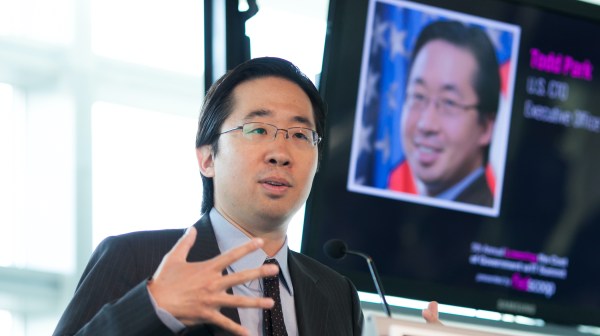
Federal Chief Information Officer Steven VanRoekel said the federal government will place a greater emphasis on finding and implementing technologies with a high return on investment to give the government more money to re-invest in innovation as federal funds continue to tighten.
Speaking before the ACT-IAC on Friday at the Reagan Building in Washington, DC, VanRoekel laid out his other priorities for 2012, saying he and his office will focus on modular development, productivity and cybersecurity, the latter he said will influence the development of all innovation solutions within the government.
He is also on the look out to bring that lean start-up mindset to government, searching for government employees with private sector experience to lend their knowledge to a number of government wide initiatives.
That process has already begun as former Social Security Administration Chief Information Officer Frank Baitman has started an entrepreneur-in-residence program at the Food and Drug Administration. On Friday, Health and Human Services Chief Technology Officer Todd Park held a brown-bag lunch with VanRoekel’s team to talk about performing like a lean start up.
“We need more Todds in this world,” VanRoekel joked.
VanRoekel also mentioned The White House release of the results of its dot-gov reform initiative as part of the way to lower government IT costs. He said that there are 1,524 .gov web sites in use from 72 different agencies, although major agencies are responsible for 91% of those. As a result of the reform, VanRoekel said that 71% of the domains will be kept, 25% eliminated and 4% merged.
Information on the .gov reform can be found at usa.gov/webreform.
VanRoekel also said he wants to concentrate on investing in technology creativity, focusing on the return of investment on initiatives than on the cost cutting reductions around them.
He wants to increase efforts to use technology to interact with and serve business and citizens and look for ways to use veterans more effectively in the workforce along with finding ways to develop multi-year funding for IT programs.
VanRoekel underscored the importance of technology and innovation, saying that with the consumerization of technology, citizens will expect to interact with the government with help of technology. This shift toward a more technology-driven population has been seen in the emergence of a “Facebook Nation,” with individuals who are fluent in technology.
“I think what we hadn’t anticipated was the effect of social media,” VanRoekel said. “We now have 80-year-olds who are getting on Facebook and embarrassing their grandkids, like my parents,” he added. Of course, that mindset is changing the way people react to government.
Instead of cumbersome, multi-step approaches to filling out something as simple as paperwork for Social Security, “they expect digital interaction with their government,” VanRoekel said.
“We have a nation of people who expect more,” he said, “and it covers the gamut of people who really interact with the government all up.”





